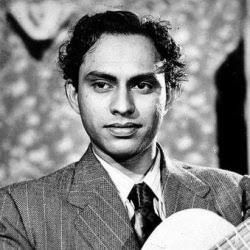Lalita Phadke
- Real Name: Lalita Deulkar
- Born: 1925
- Died: May 25th, 2010 (Bombay)
- Primary Cinema: Hindi
- Spouse: Sudhir Phadke
- Children: Shridhar Phadke
Lalita Phadke was a playback singer and supporting actress who was most active during the 1940s. Among her well-known films for which she provided playback are Sajan (1947), Nadiya Ke Paar (1948) and Shabnam (1949).
Born Lalita Deulkar in 1925 on Lalita Panchami day, she had a good voice and an affinity for music from childhood. Her uncle Pandharinath alias N Deulkar was a classical singer. Lalita learnt classical singing from Baburao Gokhale. When her father, weighed down by a huge loan and an income insufficient to provide for seven children, struggled with financial issues, Lalita was encouraged to pursue a career in acting and singing in films, a profession that was otherwise considered taboo. Poet and actor Harindranath Chattopadhyay, who had happened to visit the family’s Bengali neighbour, had heard Lalita singing and, liking her voice, had encouraged Lalita’s father to engage her in films.
Lalita was soon engaged by Bombay Talkies, where Himanshu Rai assured her father of providing her safety and a homely atmosphere in the studio. She was offered a supportive role, that of Devika Rani’s friend, in a film called, Durga (1939). Among her earliest films are Vachan (1938), and Nirmala (1938). Offered a few advertisements, wherein she acted and sang herself, she gained her first exposure to the microphone.
Post the demise of Bombay Talkies owner Himanshu Rai, Lalita left the company. She got her first break as playback singer with Angoothi (1943). With music composed by B R Deodhar, Ashok Ghosh and Babubhai Bhojak, she rendered a solo and a duet in the film, and was paid handsomely for the same. She soon went on to become a busy playback singer of the 40s, working with composers such as Master Ghulam Haider, S D Burman, C Ramchandra and Sudhir Phadke. Her partnership with C Ramchandra produced some of her most popular songs. Record company, Young India which was popular in 1930-40s, also recorded a few of her songs, both Hindi and Marathi. Phadke also provided playback in Marathi films including Prabhat’s Sant Janabai (1949), Mee Daru Sodali (1950), and Suvasini (1961).
As a singer of her era, Lalita’s tone was eloquent matched by good pronunciation, and the ability to express emotions easily and effectively. Working hard to secure her family financially, she put her voice under constant strain. When the burden eased, she settled for matrimony with music director Sudhir Phadke, and distanced herself from the rigours of daily recording.
She had first met Phadke for a Marathi opera in 1943. Being an introvert, she had kept to herself. Their next project together was a musical for AIR, which witnessed a few minor clashes between the two on account of Lalita’s Marathi pronunciation which had suffered even as her Hindi pronunciation improved. Nevertheless, she was still engaged by Sudhir for playback for Marathi films. In time, Sudhir’s brother, who had interacted with Lalita and her mother, broached the topic of a possible match. The two were wed in Pune on 29 May, 1949. It is a well-known fact that none other than Rafi sang the sacred verses or the Manglaashtak during the wedding. Rafi had rehearsed for the same well in advance; it was his gesture of gratitude to Lalita who had been a senior and had yet made him feel welcome when he was a newcomer in 1947. Incidentally, Lalita had also recommended Asha Bhosle to Sudhir Phadke for a Marathi film; Asha went on to become his main voice for female playback in Marathi films.
Post marriage, Lalita chose not to continue with playback, making a few exceptions for her husband Sudhir Phadke, both in Hindi and Marathi films. Lalita sang in six Hindi films for Phadke, three of them after their marriage. She also rendered all the songs of Kausalya, for the epic Geet Ramayan first aired on radio.
Lalita Phadke passed away on 25 May, 2010 leaving behind a son, Shridhar Phadke, a reputed singer and composer of Marathi film and non-film songs.







.jpg)


